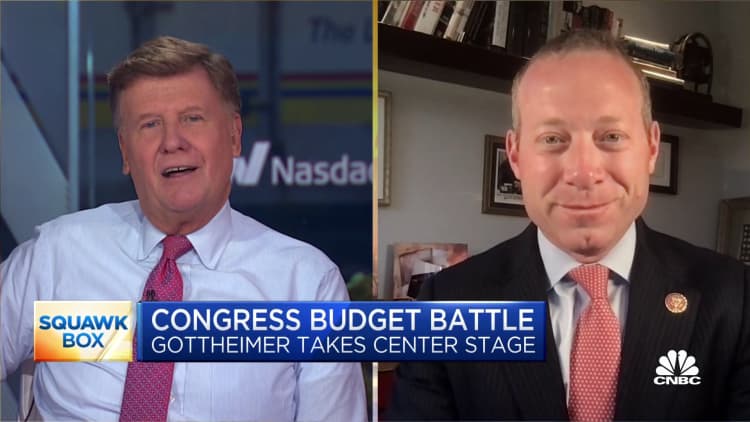Major Wall Street brokerages are urging clients to look past Democratic infighting and prepare for a torrent of new government spending as House Speaker Nancy Pelosi brings two historic measures up for a vote.
Strategists say that moderate Democrats hoping to persuade Pelosi, D-Calif., to vote on the bipartisan infrastructure bill before a $3.5 trillion budget resolution will ultimately concede for fear of risking their reelection chances in 2022.
"Our base case has been and remains that Congress will approve" a significant expansion of fiscal policy, Morgan Stanley's head of public policy, Michael Zezas, wrote in a note published Monday.
"Democratic leadership is behaving as if they've made the calculation that neither bill has the votes to pass independently of the other one," he added. "Our base case assumes that this reality ultimately persuades the group of House moderates to support the budget resolution vote and allow the dual track process to continue, though perhaps not without some attendant headlines and/or modest concession."
Cornerstone Macro, another Wall Street research firm, reinforced Morgan Stanley's optimism on both Democratic initiatives with some early-week humor.
"Trivia question. Name a top Democratic presidential priority House Democratic moderates have killed in the last four decades?" Cornerstone's strategists asked their clients. "It's a trick question. There aren't any."
Both firms say it's unlikely a group of nine centrist Democrats will follow through on a threat to hold up President Joe Biden's $3.5 trillion package of health-care, education and climate provisions currently being drafted.
Those bets will be tested later Monday, when Pelosi is expected to hold a key procedural vote that would advance both plans according to a specific, but undisclosed, timeline. Representatives return to Washington this week after a brief August break to consider both bills, which the Senate approved earlier this month.
The latest standoff between moderate and progressive Democrats comes after the nine centrists penned a letter last week that informed Pelosi that they wouldn't support the $3.5 trillion budget resolution plan before the chamber passes the infrastructure bill.
Rep. Josh Gottheimer, one of the lawmakers who called for an expedited vote on the bipartisan plan, said Monday that lawmakers shouldn't wait weeks for House progressives to finalize the budget framework to vote on improvements to the nation's highways.

The New Jersey Democrat reiterated that he's in favor of a reconciliation package but said that he would rather enact projects to fix infrastructure before being bogged down for months as the chamber haggles over a bill that combats climate change and poverty.
"We've got to get infrastructure done. The next package, the reconciliation package ... in the end, we're going to have to debate that for months," Gottheimer told "Squawk Box" on Monday morning. "All I'm saying is: Let's get it done, let's get shovels in the ground and people to work. And then we can move on to reconciliation."
On its surface, the threat from House moderates carries weight since Pelosi can afford no more than three defections in the narrowly divided chamber.
The $1 trillion infrastructure bill received 19 GOP votes in the Senate, including one from Minority Leader Mitch McConnell, R-Ky., and could get 15 to 25 Republican votes in the House. But it's unclear if any House Republicans would back the $3.5 trillion plan.
Progressives say sending the infrastructure bill to Biden's desk first could jeopardize critically needed climate and poverty measures in the larger reconciliation bill by forfeiting Democrats' leverage.
The moderates face considerable pressure from unified party leadership, including the president, Pelosi, Majority Whip James Clyburn and other top Democrats who favor passing the budget reconciliation bill alongside infrastructure.
Stifel's chief Washington policy strategist, Brian Gardner, said Democrats can't risk looking like a threat to their own party if they are at all concerned about their reelection odds in 2022.
"The party knows that losing in 2022 would doom the president's legislative agenda," he wrote in a note published last week. "The fear of an election wipeout will likely keep House Democrats in line at least long enough to pass the Budget Resolution" and keep the process moving.
"Failure on the infrastructure bills (especially the Senate bill) is not an option because it would support the current narrative of chaos," Gardner added. "Failure in Afghanistan, chaos at the southern border, the inability to confront the spread of the Delta variant, plus the possible failure of President Biden's domestic agenda would likely be catastrophic for Democrats in 2022."
— CNBC's Michael Bloom contributed to this report.


